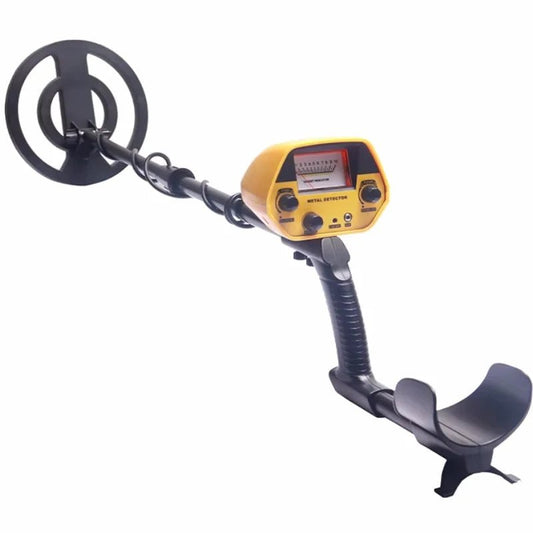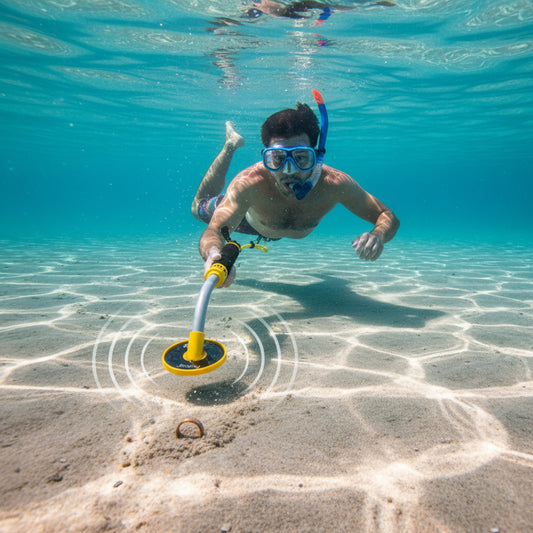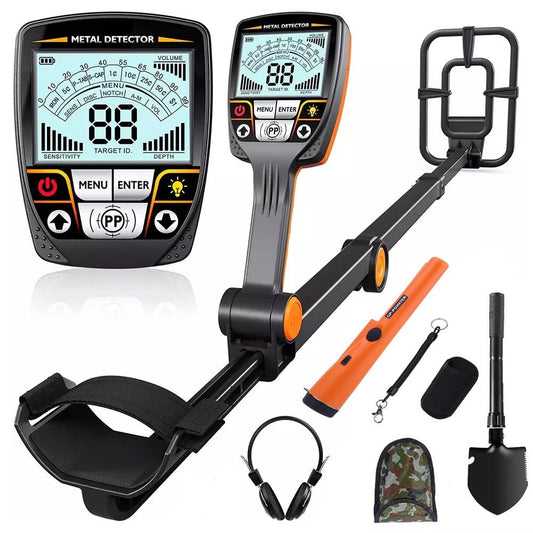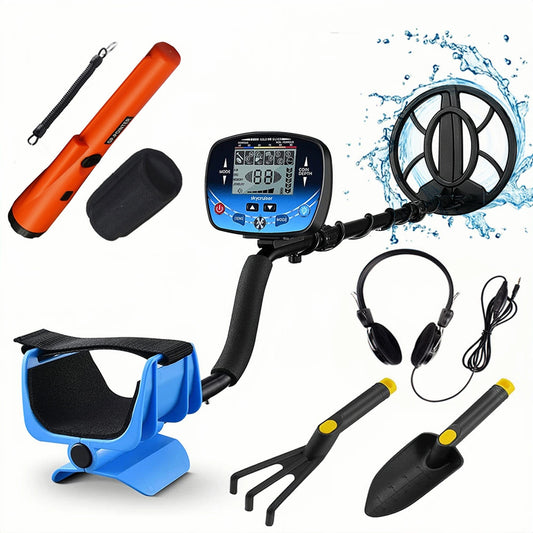
Can Metal Detecting Be Profitable? A Comprehensive Guide
Share
Understanding Metal Detecting: An Overview
What is Metal Detecting?
Metal detecting is the practice of using a handheld device called a metal detector to locate metallic objects buried underground. The detector emits electromagnetic fields that can detect metal objects, which are then identified by a change in the device's signal.

Brief History of Metal Detecting
The origins of metal detecting can be traced back to the late 19th century, when devices were developed to find landmines and unexploded ordnance. In the 1960s and 1970s, metal detecting became popular as a hobby, with advances in technology making detectors more accessible to the public.
Popular Uses of Metal Detectors
Aside from recreational metal detecting, these devices are commonly used in security, archaeology, and construction. However, for hobbyists, the primary aim is often to discover coins, jewelry, historical artifacts, or even precious metals like gold.
Can Metal Detecting Be a Profitable Hobby?

Factors That Affect Profitability
The profitability of metal detecting depends on several factors, including the locations you search, the type of equipment you use, and the time invested. High-traffic areas or places with historical significance are more likely to yield valuable finds.
Common Valuable Finds in Metal Detecting
Valuable items commonly found by metal detectorists include old coins, gold and silver jewelry, vintage watches, historical artifacts, and even small caches of gold or silver bars. These finds can be sold to collectors, pawn shops, or online marketplaces for significant profits.
Real-Life Success Stories
Many metal detecting enthusiasts have struck it big, with some finding treasures worth thousands or even millions of dollars. For example, the discovery of the Staffordshire Hoard in England, a collection of Anglo-Saxon gold and silver artifacts, brought fame and fortune to the hobbyists who uncovered it.
Equipment Needed for Profitable Metal Detecting
Choosing the Right Metal Detector
To maximize your chances of finding valuable items, it's important to choose a metal detector that matches your needs and experience level. High-quality models with advanced features such as target identification and depth indicators can make a big difference in your success rate.
Essential Accessories for Metal Detecting
In addition to a metal detector, you'll need accessories such as a digging tool, a pinpointer to help locate small targets, headphones to hear faint signals, and a carrying bag. These items make the search process more efficient and enjoyable.
Maintenance and Care for Metal Detectors
Regular maintenance, such as cleaning the search coil and checking the batteries, is crucial for keeping your metal detector in top condition. Proper care will ensure it performs accurately and lasts longer, which is vital for consistent success.
Best Places to Find Valuable Items with a Metal Detector

Beaches and Coastlines
Beaches are popular spots for metal detecting due to the large number of people who frequent them. Items such as lost jewelry, coins, and other valuables often get buried in the sand, making these locations ideal for treasure hunting.
Parks and Recreational Areas
Public parks and recreational areas can also be rewarding for metal detecting. Look for places where people gather, such as picnic areas, sports fields, or playgrounds, as these spots tend to accumulate lost items over time.
Old Homesteads and Historical Sites
Historical locations, old homesteads, and abandoned properties can yield artifacts, coins, and relics that have significant value. However, always check for permissions and local regulations before searching on private or protected land.
Learn more about the Best Places to Metal Detect.
How to Increase Your Chances of Finding Valuable Items

Researching Locations Beforehand
Before setting out, research the history of an area to identify potential hotspots for valuable finds. Historical records, old maps, and local legends can provide clues about where to search.
Understanding Ground Conditions
Different ground conditions can affect how well your metal detector performs. Wet or mineralized soil may require specific settings or types of detectors, so adjust your approach accordingly to improve your results.
Optimizing Metal Detector Settings
Learning to use the settings on your metal detector effectively can help you distinguish between valuable targets and junk. Understanding target discrimination, sensitivity, and ground balance can significantly increase your success rate.
Potential Costs Involved in Metal Detecting
Initial Investment in Equipment
The initial cost of a good-quality metal detector can range from $200 to over $1,000, depending on its features. Accessories like pinpointers, digging tools, and carrying bags can add to this cost, but they are essential for a profitable experience.
Ongoing Costs (Batteries, Accessories, etc.)
Metal detecting involves ongoing expenses such as batteries, replacement parts, and upgrading equipment. These costs should be factored into your potential profits to get a realistic picture of the hobby's financial aspects.
Travel Expenses for Metal Detecting
Traveling to different locations to search for valuable finds can also add up. Consider the costs of fuel, accommodation, or entrance fees to certain sites when calculating the profitability of your metal detecting activities.
How to Sell and Profit from Metal Detecting Finds
Evaluating the Value of Your Finds
Before selling, have your finds professionally evaluated to determine their worth. Coins, jewelry, and artifacts can have varying values depending on their condition, age, and rarity.
Selling Precious Metals and Jewelry
Items made of gold, silver, or other precious metals can be sold to pawn shops, jewelers, or online buyers. Ensure you know the current market value of the metals to negotiate the best price.
Auctioning Historical Artifacts and Coins
Rare or historically significant finds might fetch a higher price at auctions or through collectors. Platforms like eBay, specialized coin auctions, or metal detecting forums can be good places to sell such items.
How Much Money Can You Realistically Make?
Average Earnings from Hobbyists
For most hobbyists, metal detecting is not a full-time job. Typical earnings range from a few hundred to several thousand dollars annually, depending on how often you search and the value of your finds.
Professional Treasure Hunters’ Profits
Some professional treasure hunters and relic seekers make significant profits, especially if they specialize in finding high-value artifacts, historical relics, or precious metals. However, this level of success requires considerable time, expertise, and investment.
Impact of Market Conditions on Metal Prices
The profitability of selling finds like gold, silver, and other metals can be influenced by fluctuating market prices. It’s wise to monitor the market trends and sell at optimal times.
Conclusion
Is Metal Detecting Worth It for Profit?
While metal detecting can indeed be profitable, it’s important to approach it with the right mindset. The potential for finding valuable items is real, but consistent success requires skill, research, and dedication.
Final Thoughts and Recommendations
For those passionate about treasure hunting, metal detecting is a rewarding hobby that can occasionally pay off. Start with the right equipment, do your research, and enjoy the adventure—profits may just be an exciting bonus.
FAQs
-
Is metal detecting a good way to make money?
Metal detecting can be profitable, but it should be approached as a hobby rather than a primary income source. Valuable finds can bring in extra money, especially for those who invest time and effort into the hobby. -
What are the best metal detectors for finding valuable items?
Some of the best metal detectors for profitability include models from brands like Minelab, Garrett, and Fisher, which offer advanced features suitable for various environments. -
How do I get permission to detect on private land?
Always seek written permission from landowners before detecting on private property. Respecting property rights helps to maintain a good reputation for the metal detecting community




